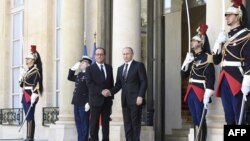They shook hands at the Elysee presidential Palace and sipped coffee in the sun, but the tense faces of French President Francois Hollande and his Russian counterpart Vladimir Putin during their recent meeting underscore a widening chasm between the West and Moscow over Syria.
Hollande offered reporters little insight into his hour-plus-long talk Friday with Putin, amid mounting Western worries over the targets and intentions of Russian air strikes in Syria.
Their discussion followed the first air attacks by both France and Russia in Syrian territory this week. The comparisons, however, end there.
France announced its strikes destroyed an Islamic State group training camp that was allegedly set up by a French citizen. Despite denials by Moscow, Russian strikes this week appeared mostly aimed at shoring up the regime of Syrian President Bashar al Assad.
The two military operations reflect battling visions over ending Syria’s bloodbath that were on the table in Paris. Islamic State “must be targeted, and not anything else,” Hollande said ahead of the talks.
France also joined allies in the U.S.-led coalition conducting the Syrian air campaign to issue a joint statement expressing concern that Russia's actions will "only fuel more extremism and radicalization.”
Differences over Assad
While Moscow argues no Syrian solution exists without Assad, Paris and Washington maintain there’s no way forward with him. Indeed, Paris went a step further on Tuesday, opening up an inquiry against the Syrian regime for possible crimes against humanity.
“You can’t put together victims and the people who are killing them,” Hollande said at the United Nations this week. “Assad is at the origin of the problem. He cannot be part of the solution.”
French authorities argue self-defense is driving their military action against Islamic State targets in Syria. France has long been a key target for Islamists, including those who killed 17 people during January’s terrorist attacks in Paris. Many are home grown. Indeed, the government claims nearly 1,900 French citizens and residents are directly involved in jihadist networks and several hundred have joined extremist groups in Syria and Iraq.
“There will be other strikes, there will be other engagements to protect us, to ensure that these training camps run by foreigners continue and train terrorists who will attack us in France and Europe,” French Defense Minister Jean-Yves Le Drian warned in a TV interview.
But whether the strikes will help turn the tide of Syria’s bloody four-year conflict is another matter. “The Americans have been bombing for about eight or nine months now,” says Francois Heisbourg, special advisor at the Paris-based Foundation for Strategic Research. “And as far as I can tell, the Islamic State is occupying more territory and is controlling a larger share of the population than when the bombing began.”
While targeted airstrikes against individual jihadist cells might work, “the bombing isn’t reversing the tide or even containing it” in Syria, Heisbourg said, adding that Iraq is a slightly different situation.
Refugees
Other factors besides militant Islam are driving the French offensive. Tens of thousands of Syrian and Iraqis have flocked to Europe, and many more are on the way. The 24,000 new refugees Paris has agreed to take in amount to only a fraction of the influx — and French authorities already face a dearth of housing for asylum seekers already here.
As the only European Union leader to launch strikes in Syria, Hollande has also struck a sharply tougher tone than his two major counterparts. Britain has suggested a political transition period that might include Assad, while German Chancellor Angela Merkel said talks on Syria’s future should include the Syrian leader.
“The more you bring Bashar into the loop, the more you’re going to increase the intensity of the civil war in Syria,” Heisbourg says of Merkel’s remarks. “The way she speaks is exactly what you would do to have more war refugees. Intensify the war, make sure Bashar is at the pivot of the political system. That is an awful recipe.”
For the moment, French public opinion is on Hollande’s side. A pair of polls in September found more than half of the population supports military action against Islamic State, including French boots on the ground.
For once, Hollande’s many critics are surprisingly muted, with both center and far-right politicians coming out in support of airstrikes. “We need to extend airstrikes,” former prime minister Alain Juppe of the Republicans party said. “But their effectiveness is limited. We saw that in Iraq. It only stabilises the situation.”
Still, it’s uncertain whether Hollande’s actions will translate into votes for an unpopular leader, as France gears up for regional elections in December, and eyes presidential ones in 2017. Public support for military action may melt, particularly following claims by a Syrian activist group that Sunday’s strikes killed child soldiers.










